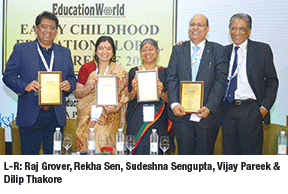Government control of ECCE: pros and cons
 Against the backdrop of the Union government having made early childhood education subject to official regulation for the first time by formulating a National Early Childhood Care and Education (NECCE) policy which received cabinet approval on September 20 last year, the first panel discussion of the EW ECE Global Conference 2014 focused on the subject of ‘Government control of ECCE — pros and cons’.
Against the backdrop of the Union government having made early childhood education subject to official regulation for the first time by formulating a National Early Childhood Care and Education (NECCE) policy which received cabinet approval on September 20 last year, the first panel discussion of the EW ECE Global Conference 2014 focused on the subject of ‘Government control of ECCE — pros and cons’.
Chaired by Dilip Thakore (DT), editor of EducationWorld, the panel comprised Dr. Rekha Sen (RS), chair professor, Centre for Early Childhood Development & Research, Jamia Millia Islamia University, Delhi; Sudeshna Sengupta (SS), head advocacy of Delhi-based NGO Mobile Crèches; Raj Grover (RG), chief mentor of Kangaroo Kids Education which has nurtured over 100 preschools under the franchise model across India; and Vijay Pareek (VP), the Bangalore-based national operations manager of EuroKids International Pvt. Ltd.
Excerpts from the 100-minute panel discussion which provoked passionate and animated comment from the panelists, and enthusiastic participation from the floor.
DT: Six months ago, the government approved a policy to regulate privately provided early childhood education for the first time. But government regulation in private primary-secondary education has proved to be a two-edged sword, and opened up opportunities for bribes-hungry education ministry inspectors. So maybe NECCE will destroy the progress made in ECCE thus far. What’s your comment Dr. Sen?
RS: I am an academic and don’t represent the government. However the NECCE policy is the outcome of sustained advocacy and campaign by activists to ensure that every child in the age group 0-5 years receives minimally acceptable quality ECCE. Government regulation is necessary to ensure minimum quality and standards. Article 45 of the Constitution promised provision of early childhood education to all children until age 14, within ten years of its commencement, but it has taken over 60 years for the NECCE policy to be approved, so we should welcome it.
DT: The Union government’s ICDS programme, started in 1975 to provide early childhood care and nutrition to children in the 0-5 age group, covers barely 50 percent of the 158 million children and currently 46 percent of the country’s children suffer severe malnutrition. Government intervention has been a complete failure, so why should it succeed in ECCE?
RS: ICDS might have done a poor job of nutrition but I believe government will do a better job in early childhood education. Ensuring quality and standards in ECCE is a government responsibility, and it must be held accountable for them. This is not to say we don’t need private preschools. We need everyone to pitch in to provide for our 158 million children under age five. However private sector preschools are high end and also mere creches which certainly need regulation to deliver quality. The first objective is for preschools to register by adhering to minimum teacher pupil ratios, floor area, and infrastructure requirements. The next step is accreditation which involves appraisal perhaps through peer rather than government review. Government regulation need not be heavy handed.
SS: The essential purpose of the NECCE policy is to showcase the country’s commitment towards infants — providing equality of opportunity, right to dignity and non-discrimination. This policy has come after 65 years of independence and underscores society’s commitment to invest in human capital development. It is also an admission that government must take responsibility of being the primary provider of ECCE. There will be private institutions but privatisation is not synonymous with high quality and therefore all preschools must be subject to regulation to ensure minimum standards.
RG: I feel the NECCE policy is an overdue initiative, a big leap forward. According to research conducted by Nobel laureate Dr. James Heckman, the socio-economic returns of investing in early childhood education are much higher than investing subsequently in the education continuum. I am definitely in favour of the NECCE policy which is well-intentioned. My fear is that at the execution level, the government will fail to deliver.
VP: We are discussing a very complex subject which needs intensive debate. The Indian experience is that private edupreneurs have always provided quality education. But because ECCE has been unregulated, people are running unbranded preschools which need standards and regulations. I am for laws to regulate ECCE, but care has to be taken that they don’t translate into corruption and exploitation. In the past, there have been many instances of education legislation falling short in terms of enforcement.
DT: But India’s education legislation is enforced only against private institutions. Government institutions go scot free.
SS: You need laws to harmonise the quality of education dispensed both in the private and public sectors. But we can’t allow laissez-faire in education for fear of corruption.
RS: After 60 plus years the NECCE policy is a document the government has given to itself. Both the private and public sectors need to take the opportunity of engaging in establishing ECCE councils and take the government to task over enforcement across all sectors. Greater teacher involvement is required in this collective endeavour.
DT: It’s highly unlikely that government will provide quality ECCE. In primary-secondary education children are fleeing free-of-charge government schools to enroll in fees-levying private schools. Currently 40 percent of all school-going children are enroled in private sector, mostly unrecognised budget schools.
RG: Low-cost or budget schools have emerged as a result of the frustration of parents with government schools where learning outcomes are abysmal. There is also a desire of parents for English-medium education which private schools offer. Thousands of government schools countrywide are closing down. Public-private partnerships are needed to save and revive the country’s 1.3 million government schools.
DT: Although children are fleeing vernacular government schools to private English-medium schools, the NECCE policy prefers the mother-tongue as medium of instruction. Why should bureaucrats decide the medium of instruction?
SS: Ignorant parents with herd mentality are flocking to low-grade English-medium schools which is harmful to the cognitive development of children. It should be the responsibility of the education fraternity to guide parents of preschool children about the benefits of children learning in their mother tongue.
VP: This decision should be left to parents who are the best judges of what’s best for their children.
DT: Even though government regulation is a two-edged sword, the consensus of this panel is that the NECCE policy is a socially beneficial development which prescribes minimum standards for preschools. The alternative to government regulation and certification of preschools could be peer review and certification of new preschools through independent organisations such as the Early Childhood Association. Moreover there’s general agreement that ECCE teachers and educators need to become involved in implementation of the NECCE policy.
















Add comment